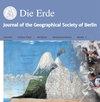Social resilience and agency : perspectives on ageing and health from Tanzania
IF 0.6
4区 地球科学
Q3 GEOGRAPHY
引用次数: 1
Abstract
This paper critically examines our framework of social resilience (Obrist et al. 2010) in the light of recent literature and has two objectives: First, it intends to refine our understanding of social resilience through a conceptualization of agency, and secondly, it aims at contributing to the growing body of literature on resilience, ageing and health. In the language of sustainable development, “agency” is commonly used as a synonym for “capacity” or “capability”. We will draw on approaches developed in the social and cultural theory to sharpen the analysis of the relationship between resilience and agency. To illustrate this refined perspective, we draw on empirical research on ageing, agency and health in Tanzania. We will take the threat of old age frailty and disability as a starting point, explore empirical situations of old age care as an engagement (or disengagement) by actors of the multiple social and cultural configurations that constrain or enable actions, and examine whether, through the interplay of habit, imagination, and judgment, these engagements reproduce or transform those structures and thus build social resilience to the threat of old age frailty and disability. This approach enabled us to identify several constellations which opened up interactive spaces for the public or private deliberations of available options (practical-evaluative agency), the active generation of possible future trajectories (projective agency) and sometimes even for structural modifications (transformative agency) with regard to old age care. Our findings further indicate that individual and collective actors positioned at the intersection of diverse fields of practice can develop more evaluative, projective and even transformative agency.社会复原力和能动性:坦桑尼亚对老龄化和健康的看法
本文根据最近的文献,批判性地审视了我们的社会弹性框架(Obrist et al. 2010),并有两个目标:首先,它打算通过代理的概念化来完善我们对社会弹性的理解,其次,它旨在为越来越多的关于弹性、老龄化和健康的文献做出贡献。在可持续发展的语言中,“机构”通常用作“能力”或“能力”的同义词。我们将借鉴社会和文化理论中发展的方法,以加强对弹性和代理之间关系的分析。为了说明这一精细化的观点,我们借鉴了坦桑尼亚关于老龄化、机构和健康的实证研究。我们将以老年虚弱和残疾的威胁为出发点,探索老年护理的经验情况,作为约束或使行动成为可能的多种社会和文化配置的参与者的参与(或脱离参与),并检查是否通过习惯、想象力和判断的相互作用,这些参与复制或改变了这些结构,从而建立了对老年虚弱和残疾威胁的社会弹性。这种方法使我们能够确定几个星座,这些星座为公共或私人讨论可用选项(实际评估机构),可能的未来轨迹的积极生成(投影机构)开辟了互动空间,有时甚至为老年人护理的结构修改(变革机构)提供了空间。我们的研究结果进一步表明,处于不同实践领域交叉点的个人和集体行动者可以发展出更具评估性、投射性甚至变革性的机构。
本文章由计算机程序翻译,如有差异,请以英文原文为准。
求助全文
约1分钟内获得全文
求助全文
来源期刊

Erde
GEOGRAPHY, PHYSICAL-GEOSCIENCES, MULTIDISCIPLINARY
CiteScore
2.90
自引率
6.20%
发文量
0
审稿时长
>12 weeks
期刊介绍:
DIE ERDE is a publication of the Geographical Society of Berlin
DIE ERDE is a scientific journal in Geography, with four issues per year with about 100 pages each. It covers all aspects of geographical research, focusing on both earth system studies and regional contributions.
DIE ERDE invites contributions from any subfield of both Physical and Human Geography as well as from neighbouring disciplines.
 求助内容:
求助内容: 应助结果提醒方式:
应助结果提醒方式:


